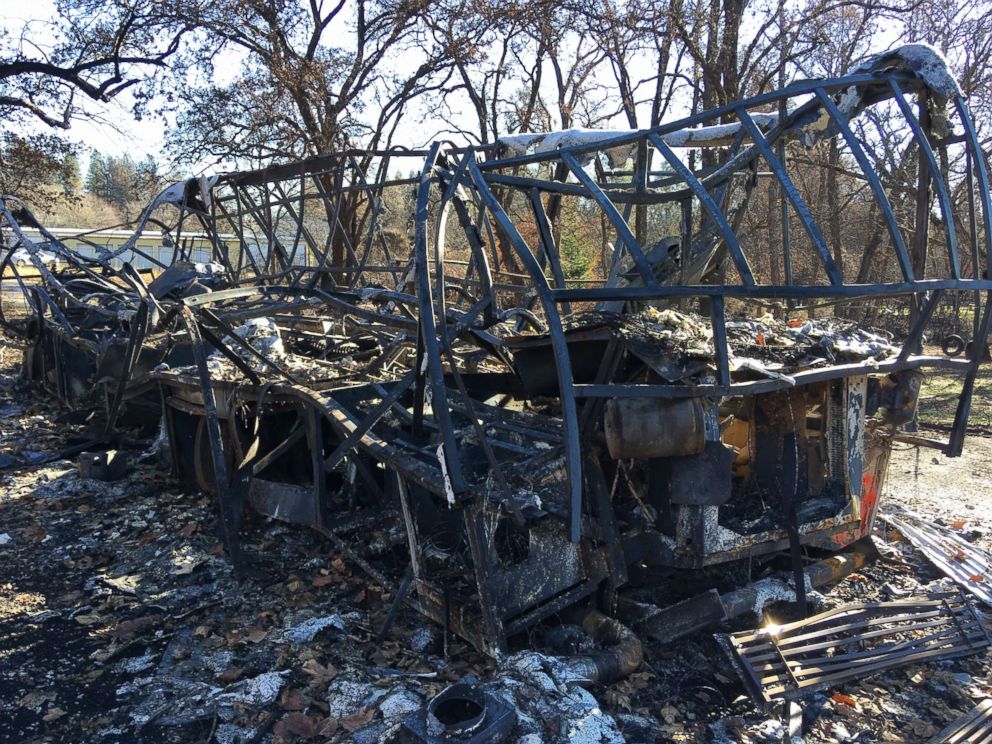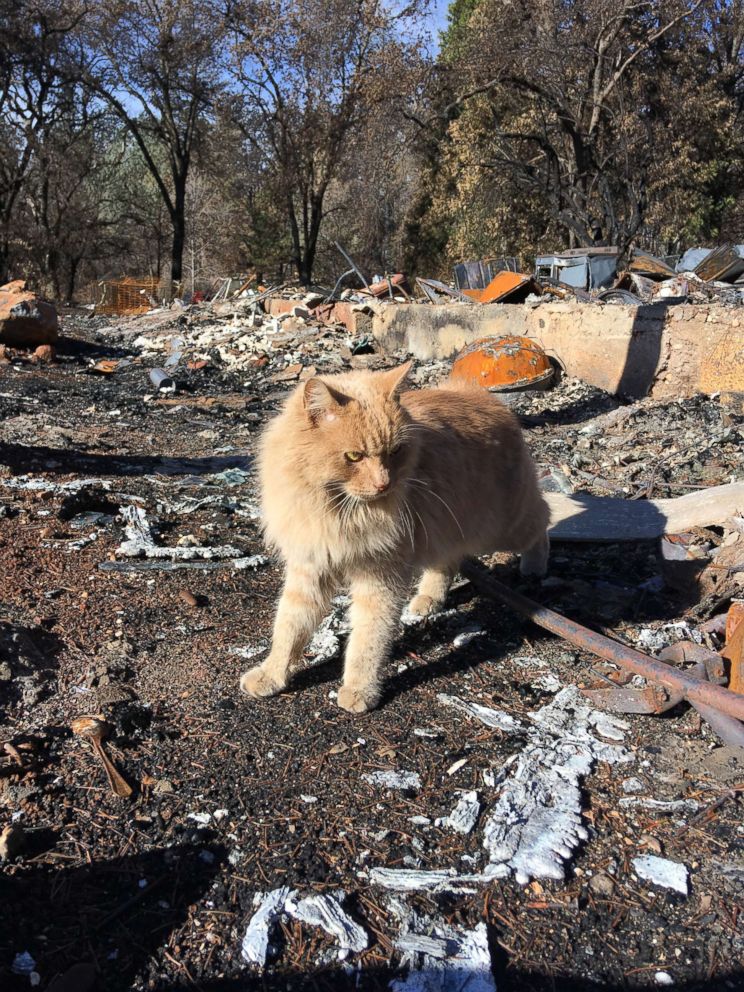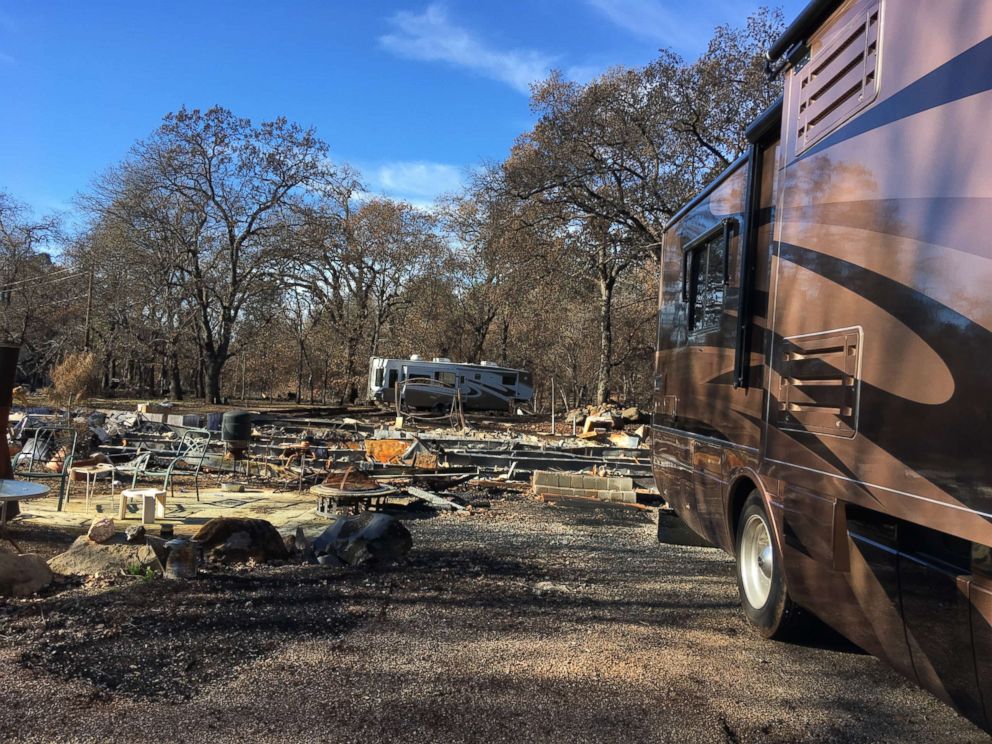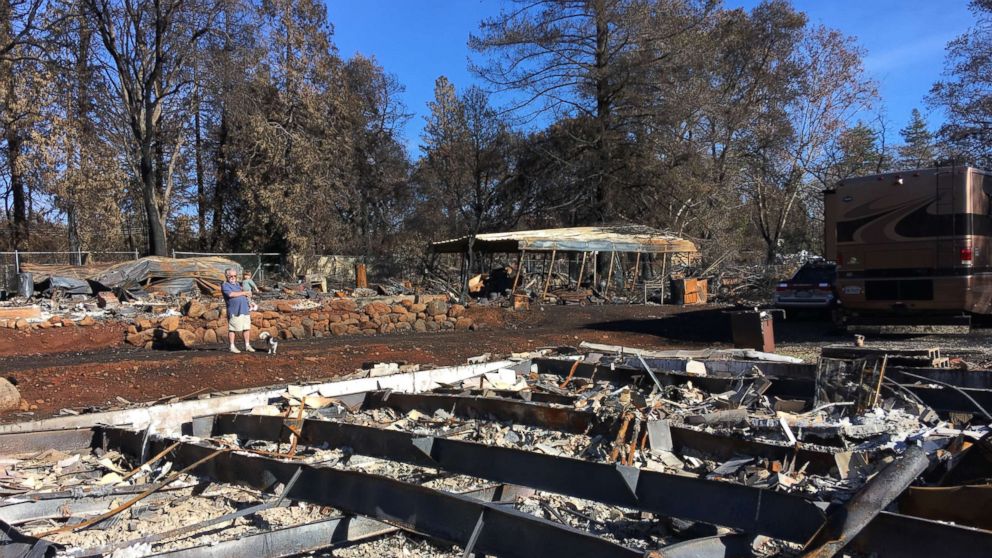Paradise residents struggle to celebrate holidays after Camp Fire devastation
This holiday season has proven especially difficult for Paradise, California, residents where the Camp Fire reduced homes, businesses and lives to ashes.
Nicole Hoenig and her 2-year-old daughter Mira celebrated Christmas as best they could, but the stark reality of loss made it hard to have a normal holiday.
"We're trying to have a Christmas, you know, in any way shape or form that we can," Hoenig told ABC News. "It’s just everyone doing the best they can, trying to give your kids whatever you can to help them feel normal."
Watch the full story on "Nightline" tonight at 12:35 a.m. ET on ABC.
After being displaced by the fires, Hoenig and her family, like many Northern California residents, could not spend the holidays at home. Hoenig spent Christmas at a friend’s pool house, where she has been staying.

Her father Jim Hoenig was living in his RV in a Lowe's parking lot in Chico, California, about 15 miles away from Paradise.
"I came into this world with nothing, I'll leave with nothing and in between is the stuff that I can do and help other people with," Hoenig's father said. "I'm perfectly set."
The Hoenig's were just three of the nearly 50,000 people in Butte County displaced by the Camp Fire -- which authorities deemed the most destructive and deadliest in California history.
The inferno claimed all but a single box of their family mementos.
"The sentimental value of it is more than anything I could ever explain. Because it’s the only thing I’ll ever be able to give her," Nicole Hoenig said of the now prized possessions. "It means the world to be able to pass some of that stuff down to her."
Jim Hoenig drove his RV back to his burned out property on Christmas Eve. There, amid the rubble, he found his cat Rusty who had been missing since the fire broke out -- it was a Christmas miracle.

When the Camp Fire started on Nov. 8, neighborhoods quickly went up in flames, torching cars, burning down homes and leaving little more than ashy debris.
This was unlike an ordinary fire, with winds reaching speeds up to 50 mph, which helped to fuel the flames and sent sparks flying through the air, creating a firestorm.
The fire burned the area for 17 days, scorched over 153,000 acres and killed at least 86 people, hitting the town of Paradise the hardest.
The rapidly shifting fire forced many residents like Nichole Jolly to evacuate with only the clothes on their back and drive through blinding smoke and flames.
Jolly told ABC News that in the moment of her escape, she didn't think she was going to make it out alive.
"I knew I was going to die if I stayed in my car," she said. "I called my husband and just said, 'I don’t think I’m going to make it out of this. It’s coming in too fast,'" she recalled days after the fire. "I thought I was going to die right there."
Luckily she escaped thanks to a heroic pair of firemen.
"I couldn't breathe, the air was so hot, it was burning my lungs, you couldn't see anything," she said. "The back of my pants were on fire and two firemen picked me up, extinguished my pants, put me into their fire engine and put a fire blanket over me."
Jolly said she told her husband, "I'm alive. I'm here and I love you."
In the following weeks, she returned to her childhood home that had burned to the ground.
"It’s so sad," she said. "I’m happy that I got out with my life."
Her family lost nearly everything.
"It's awful just terrible to see everything that we worked so hard in our lives just gone," Jolly said crying.
The emotional toll coping with their loss around the holiday season has been especially difficult.
"This was the glue to our family was this house," Jolly said of the home where they used to celebrate Thanksgiving.
But this year, Jolly "didn’t have Thanksgiving" she said, because "We couldn’t fit a turkey in our motor home oven."
Jolly plans to rebuild, but her home was one of 14,000 destroyed by the Camp Fire and the surrounding housing market is dire.
Ed Mayer, the executive director of the Butte County Housing Authority, said the lack of property is a "secondary crisis."
"Everything is in upheaval mode right now," Mayer said. "Fire's out but now we're dealing with a secondary crisis -- Not enough housing."

According to Mayer, 14 percent of homes in Butte County were decimated by the fire, exacerbated by the already high demand for homes in California.
He said that before the Camp Fire, the housing authority thought there "was around one and a half [to] two percent vacancy rate."
"All of those units were instantly absorbed by those coming out of the fire. So there really is no housing availability locally at all. Nothing," he said bluntly.
Mayer also said that price gouging and bidding wars have become the norm for residents who lost everything, but have the means to rebuild.
"We've had clients coming in saying landlords have proposed $500 a month rate increases," Mayer said. "There is a cap on rent increases, but we've seen the local 'For Sale' market kind of go crazy. We have folks bidding houses well above asking price on a regular basis."
Affordable housing is also now hard to come by, especially for those hardest hit like the elderly and the poor, who are left to decide between transitional housing or shelters.
"There's really no other place for them to go. There's no other place in California that offers affordable rents and proximity to services," Mayer explained. "So this is going to be a very, very difficult situation to work through."
FEMA has roughly 2,000 temporary trailers on standby ready to deliver to Butte County, but the problem is on the local level and finding available space for the trailers.
"Not everyone wants to have a FEMA-manufactured home complex behind their house," Mayer said.
Residents have been cautioned against moving trailers onto their properties without basic infrastructure where their homes once stood because much of the areas may contain toxic ash.
Additionally, not everyone is qualified for federal help.
Daniel Wynne, an external affairs technical specialist at FEMA, said the process can be confusing but ultimately FEMA is there "to assist in long-term recovery."
"It is a confusing process, but we are not the first responders," Wynne said. "You have excellent first responders in your community. We are here with state and county to assist in long-term recovery."
One assistance facility in Chico, California, averages 800 people per day, all of whom are seeking help to move forward.
Residents of Paradise didn't lose just their homes, they also lost businesses and jobs.
The Feather River Hospital where Jolly worked closed after suffering extensive damage, leaving her and hundreds of other nurses out of work.
"I am not able to work right now. The hospital is going to rebuild, they said. But it’s going to be at least a year if not two before they are up and moving again," she explained. "I’m looking for work, but so [are] 300 other nurses."
Jolly said she spent her last moments at Feather River helping get patients to safety as flames engulfed the property.
"We put tape on the doors when we knew that that room was evacuated, we shut the door so nobody went in there, we got the whole hospital out," she recalled.
Jolly started a GoFundMe page, like thousands of others, to help those left in the wasteland they used to call Paradise.
"I want to help every one of them and I know they want to help me. But it’s hard because we’re all - we’re all on the same page. We’re all in the same boat," she said. "We can’t help each other because we can barely survive ourselves."
Pleas for help have been heard by many statewide.
The Spirit of Liberty Foundation flew up from Southern California with Santa to deliver gifts in time for Christmas. Paradise residents were overwhelmed by the kindness of strangers who brought the joy of Christmas to the Silver Dollar fairgrounds turned Red Cross shelter.




